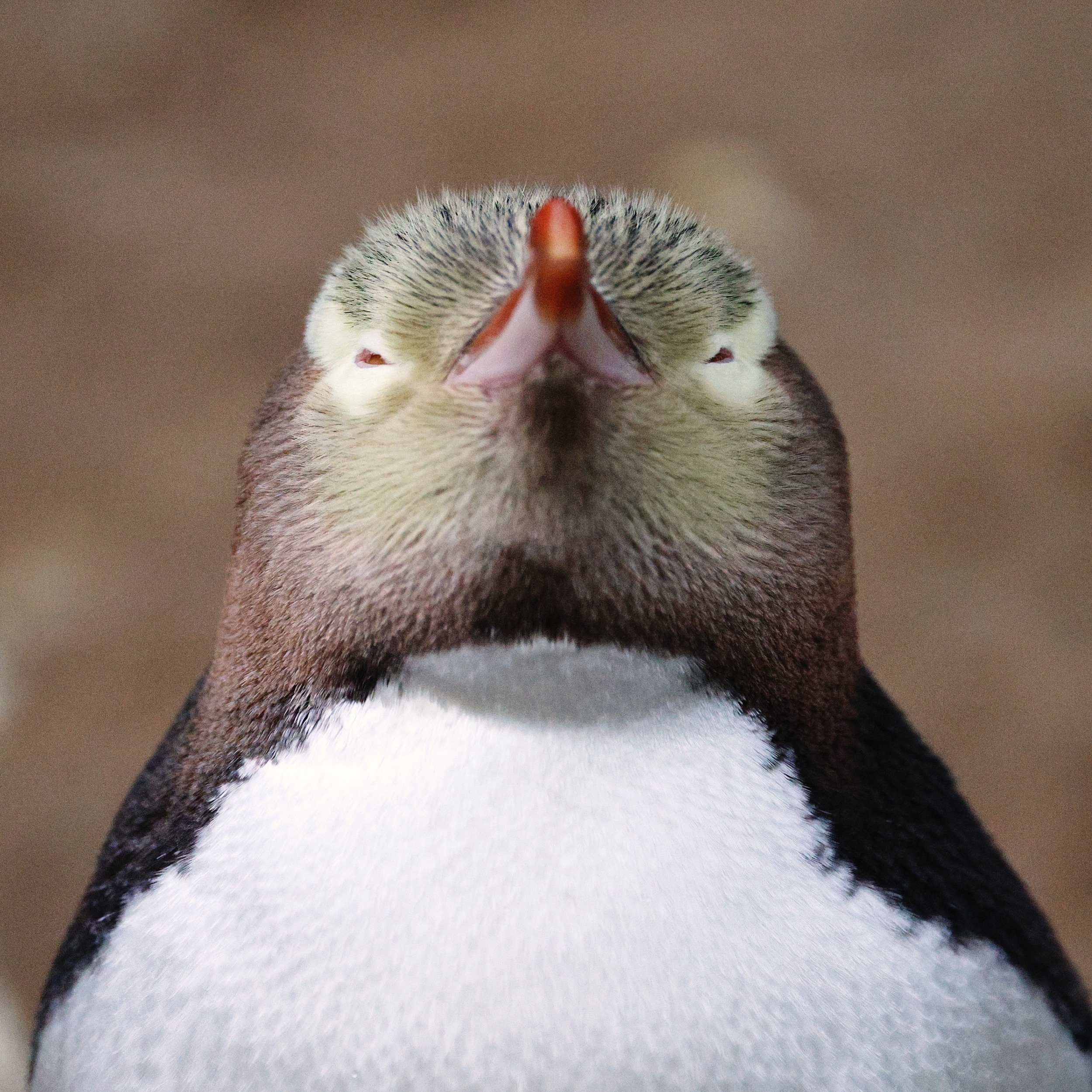The OPERA
Suzanne Middleton, Wild Dunedin – Mar 5, 2024
A farm in a past life, and now a thriving sanctuary for native plants and animals, The OPERA - Otago Peninsula Eco Restoration Alliance, formerly Penguin Place, has big plans for the future under the guidance of new owners Ike and Jerad Haldan who bought the property in April 2023.
The influence that The OPERA has on the hoiho population in the Otago Peninsula has allowed them to thrive. Image by: The OPERA
Running down to beautiful Pipikaretu Beach, with a long history of human activity, including evidence that Māori ate moa by the beach hundreds of years ago, the property was transformed from a working farm into a crusading endeavour to save endangered hoiho/yellow-eyed penguins by previous land owner Howard McGrouther and conservationist Scott Clarke starting in 1985.
View of Pipikaretu Beach, situated nearby to the hamlet Harington Point and the village Otakou. Image by: The OPERA
Before the arrival of European settlers, Muaūpoko/Otago Peninsula was covered in forest and four species of moa lived here in the more distant past, with sizes ranging from 40 to 250kg. The forest on the harbour edge was logged for timber for housing by the European settlers, and most of the rest of the native trees were burnt to create bare land for farms to feed the demand for dairy products from the growing settlement in Dunedin.
With the loss of the forest and the introduction of predatory animals such as rats, mice, stoats, ferrets and weasels, bird numbers reduced drastically, while introduced possums destroyed native vegetation and ate the birds’ eggs. As their habitat disappeared and they were eaten by predators, the numbers of native birds rapidly decreased.
Badly affected by human encroachment into their environment, hoiho on Muaupoko were in serious trouble in the 1980s when McGrouther and Clarke began their pioneering work to protect and enhance their habitat. While still farming part of the property, they funded their conservation programme through tourism, taking tourists to view hoiho while out of sight in specially built trenches. A rehabilitation facility designed for penguins was added later, a safe place where injured, starving and unwell hoiho were treated for their injuries, fed and brought back to health before being released back into the wild.
Aerial view of a sunset at The OPERA. Image by: The OPERA.
After nearly 36 years of protecting and nurturing hoiho and enhancing their habitat, Penguin Place was put on the market, and the local conservation community held its breath, speculating on who might buy this property which had become so crucial for hoiho.
Enter Ike and Jerad Haldan from the USA, a match made in heaven for Penguin Place. Ike has spent most of his life in and around nature throughout the Western United States. Nature and ecology have always been the centre of his passions and he has spent most of his life working in sustainable agriculture, conservation, reforestation, and habitat restoration. Jerad has spent most of his life living in the Pacific Northwest of the United States. He has dedicated his career to making a difference in the world. Prior to moving to New Zealand to focus on conservation, he spent 20 years working at a global non-profit that empowered university students to create lasting solutions to social issues.
Here's why they have landed up here:
Ike: “We fell in love with Dunedin and specifically the Otago Peninsula and decided it was where we wanted to call home. We plan to make The OPERA a hub for wildlife to spread from across the Otago Peninsula and beyond, and a place for people to be able to enjoy nature and all of its wonders.”
Jerad: “Dunedin is the wildlife capital of New Zealand, so it only made sense that we would end up here. We were looking for an opportunity to combine our passions for conservation and making a difference in the world. Our goal with The OPERA is to create a 100-year regeneration plan that will reforest and rewild this incredible portion of the Otago Peninsula, restoring it to a space teeming with native New Zealand vegetation and wildlife.”
Back to the yellow-eyed penguins. Their te reo name hoiho translates as ‘noise shouter’, describing their very shouty voices. But they are not at all sociable and choose to be solitary. Unlike kororā/little penguins which project confidence and often emerge from the sea and walk up the sand to their nests in full view of people, hoiho will turn around and run back into the water if they see humans. Sadly, if this happens, a hoiho that is returning to feed its chicks may digest the food that it has been holding to regurgitate, and the chicks won’t get any dinner that night. So managing planting, habitat restoration, monitoring hoiho health and breeding, while also running a tourism business where visitors get a chance to see them in the wild is a very delicate business.
And hoiho can inflict serious injuries to the arms of people who are feeding and caring for them in the rehabilitation facility that looks after more than 250 hoiho every year, plus random visitors such as Fiordland crested penguins and even recently an Adelie penguin from Antarctica.
The OPERA cares for more than 250 hoiho every year at their rehabilitation facility. Image by: The OPERA
Ike and Jerad plan to renovate and extend the rehabilitation facility. As well as habitat loss, hoiho are affected by various diseases, disturbance by humans, predation by dogs, cats and other introduced mammalian predators, reduced numbers of their preferred fish prey in the ocean, commercial set nets and fishing practises that affect the sea floor, warming of the ocean, and natural predators such as barracouta, sharks, seals and sea lions.
To ensure the survival of hoiho in the South Island, many agencies, charities and individuals must play a vital role. The OPERA is an essential link in this chain which also includes the Dunedin Wildlife Hospital, Yellow-eyed Penguin Trust, and the Department of Conservation. Penguins in the region that are picked up by the Trust and DOC requiring treatment are taken to the Wildlife Hospital for medical care or brought straight to The OPERA for rehabilitation. Once they are healthy, the birds are released back into the wild.
In addition to continuing the important work that was being achieved by Penguin Place, Ike and Jerad are converting large sections of previously farmed parts of the property into native forest, and focusing on kororā as well as hoiho. Kororā breed in the dunes at Pipikaretu Beach and they have also benefitted from habitat enhancement and predator control over the years, but the plan now is to up the ante on their monitoring and protection. Seals and sea lions on the beach will also be monitored, and longer term, enhanced fencing and predator control will mean they can introduce different native species.
The OPERA have dedicated their time to converting large sections of farmland into native forest. Image by: The OPERA
The OPERA has been quick to reach out to the many well established and hardworking conservation groups and individuals on Muaupoko who have successfully eradicated most of the possums, planted thousands of native plants, monitored birds, protected native species and educated the public over many decades.
The arrival of Ike and Jerad has elicited a sigh of relief among local conservationists. With their 100-year plan, they show a huge commitment to putting right some of the damage caused to nature by human activity, into the future and beyond all our lifetimes. And now they have become the first Premier Sponsor of Ōtepoti Mohoao/Wild Dunedin/NZ Festival of Nature for 2024, a Festival that celebrates the natural wonders of Ōtepoti/Dunedin and highlights the work of the many groups and individuals working to protect our wildlife and wild places. We are hugely grateful for their generosity and for their understanding of what the Festival is trying to achieve. Not one but two princes straight out of an opera.
Learn more about The OPERA or book a tour at https://theopera.co.nz/













